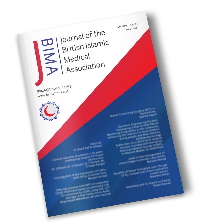
Aljafar R, Khamliche A, Tsilidis KK, Dehghan A.
Imperial College London, London, UK
Correspondence to :
Dr. Rami AlJafar [email protected]
Abstract of poster which was presented at the BIMA National Conference , Birmingham 7th December 2019
Background
Ramadan fasting is one of the five pillars of Islam. The number of studies conducted to explore the impact of Ramadan fasting on health is relatively low compared to the number of Muslims who perform this religious practice every year. Previous studies reported contradictory results about how Ramadan fasting affects health.
Methods
Five clinics in five different mosques in London were set up to collect data twice from worshippers. We collected data from 85 participants (45 men and 40 women, age 45.39 ± 15.89). The first visit was one week before Ramadan and the second visit was during the second week of Shawaal (the month after Ramadan). Collected data included Blood pressure, blood samples and body composition. Also, we asked participants to fill out a three days’ food diary before and during Ramadan to monitor change in food intake. Moreover, participants answered a questionnaire about different aspects of their lifestyle such as sleep pattern and smoking before and after Ramadan.
Results
We reported a significant reduction in systolic and diastolic blood pressure with mean differences of 7.30 mm Hg (p-value < 0.001) and 3.42 mm Hg (p-value < 0.001) respectively. Likewise, a significant reduction was noticed in weight (mean difference = 1.60 kg, p-value < 0.001), waist circumference (mean difference= 1.83 cm, p-value= 0.004), hip-circumference (mean difference= 3.05 cm, p-value < 0.001), fat percentage (mean difference = 0.92 kg, p-value= 0.002), fat mass (mean difference= 1.19 kg, p-value < 0.001). There was non-significant reduction in fat free mass (mean difference= 0.50 kg, p-value= 0.15). The rest of data are understudy.
Conclusions
Our study showed that Ramadan fasting is significantly associated with a positive reduction in blood pressure and most of anthropometric measures. However, it is still not clear whether these changes are temporary or permanent.
Acknowledgement
This study was partially funded by the Royal Embassy of Saudi Arabia , Cultural Bureau, London

